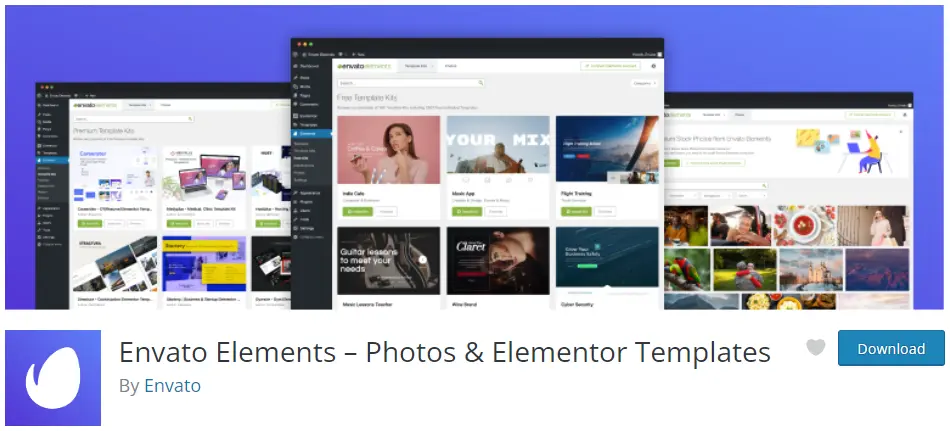Are you looking to establish a successful career in the WordPress realm?
You need to create an absolutely stunning WordPress developer portfolio. Your portfolio is your chance to showcase your skills and impress potential clients.
Top Skills Clients Look for in a WordPress Developer Portfolio
Firstly, let’s talk about the skills that clients look for in a WordPress developer portfolio. Then we will tell you how to create a stunning portfolio on WordPress.
1. Theme Customization
This skill is all about tweaking an existing WordPress theme to suit specific needs, whether it’s changing colors, fonts, layouts or adding new functionalities through plugins.
If you’re a developer with theme customization experience, clients will know that you can modify existing themes to match their exact requirements.
2. Theme Development
Clients want their website to stand out from the crowd and reflect their brand’s unique personality. That’s why they love to hire developers with theme development skills in their portfolios.
By creating a custom theme from scratch, you can tailor the website to match the client’s vision and needs, giving them complete control over its design and functionality. It’s like creating a bespoke suit – tailored to fit the client perfectly, and no one else has a suit like that!
To prove your experience in WordPress theme development, create one or more WordPress themes in the WordPress.org themes repository and add them to your developer portfolio.
3. Plugins Development
Plugins Development is a skill that can make your portfolio more attractive to potential clients. Sometimes, clients may have a specific need or feature they want to add to their website that requires a unique plugin.
Having experience in plugin development shows clients that you can handle complex projects and has a deep understanding of how WordPress works. It can also set you apart from the competition and give you an edge when it comes to securing new projects.
Linking public WordPress plugins on the WordPress.org plugins repository, or on GitHub gives your potential clients the opportunity to measure the exact quality of your work.
4. Page Builders
With page builders like Elementor, Divi etc., your clients can create unique and visually appealing layouts quickly. Page builders also eliminate the need for them to write code manually.
Make sure to learn how these page builders work from their documentation sections.
5. WooCommerce
Clients are increasingly looking for developers who can handle their eCommerce sites, and WooCommerce is a popular choice.
With a skilled WooCommerce developer on board, clients can rest assured that their online store will be running smoothly and efficiently.
6. Database Management
When it comes to creating or managing a WordPress website, clients want to make sure that their content and information are in good hands.
WordPress is built on top of a MySQL database. So, having experience in this area is a valuable asset for you to impress your clients.
To resume, prove that you know how a database works and that you are comfortable using common database management tools like phpMyAdmin.
7. Domain and Hosting Management
Domain and hosting are like the foundation of any site. Nobody wants to build a house on a shaky foundation. Likewise, clients want to have someone who knows setting up a domain and hosting correctly.
8. Search Engine Optimization (SEO)
Clients want to make sure that their visitors can find their site when they’re searching for things related to their business or industry. That’s where an experienced WordPress developer with knowledge of SEO comes in.
As an SEO-savvy WordPress developer, you can structure your client’s site in a way that search engines can easily understand.
9. Digital Marketing
In this online era, having a digital marketing acquaintance is a huge advantage. As a WordPress developer with digital marketing expertise, you can help your clients take their online presence to the next level.
By integrating email marketing campaigns, you can help your clients build strong relationships with their audience and ultimately boost their sales.
10. UX, UI and Site Architecture
When you combine UX, UI, and site architecture knowledge, you create a recipe for success as a WordPress developer.
Clients are always looking for developers who can create beautiful, easy-to-use sites that are optimized for both users and search engines.
By showcasing your expertise in these areas, you can take your WordPress development career to the next level.
11. Figma and PSD to WordPress
Figma to WordPress and PSD to WordPress are processes that involve converting a Figma or Photoshop design (PSD) into a fully functional WordPress site.
By having experience with these tasks, you can easily take a designer’s PSD or Figma files and turn them into a fully functioning WordPress site that looks exactly like the original design.
12. CrossBrowser Compatibility Testing
Different web browsers may display websites differently. By having experience in cross-browser compatibility testing, you can ensure that your client’s website looks and functions correctly, no matter what browser their visitors are using.
This skill can help your clients improve their overall user experience, reduce the number of bugs and errors on their site, and ultimately help increase conversions and revenue.
In 2023 the most popular browser testing platforms are BrowserStack and LambdaTest.
13. Security and Speed Optimization
It’s important to demonstrate your ability to create websites that are optimized for performance, security, and user experience. By highlighting this expertise, you can draw in more clients who value these skills.
Remember, clients want their websites to load quickly and provide a seamless user experience. By emphasizing your experience in this area, you can show them that you’re the right person for the job.
In summary, find a way to inform your potential clients that you can optimize a website with speed optimization testing tools like PageSpeed Insights from Google, Pingom Tools, or GTmetrix.
14. Backup, Migration, and Bug Fixing
Website backups and migrations are critical for maintaining the integrity of a site. If something goes wrong with the website, having a recent backup can save a lot of time, money, and headaches.
Similarly, if a client wants to move their site to a different hosting provider or domain, having experience in migration can make the process go smoothly and efficiently.
In addition to that, bug fixing is an important skill for any WordPress developer. Even the most well-built websites can have bugs and errors, and clients rely on their developers to fix these issues quickly and effectively.
By having this expertise, you can provide your clients with peace of mind knowing that their sites are secure, backed up, and functioning properly. This can lead to better client relationships, repeat business, and referrals.
15. Github and BitBucket
If you’re a WordPress developer, you know that having the right tools can make all the difference in landing your dream clients.
One of the most valuable tools in your arsenal is experience with GitHub and BitBucket. Why? Because these platforms are essential for version control, collaboration, and project management.
With GitHub or BitBucket, you can easily track changes to your code, collaborate with other developers, and manage your projects from start to finish.
Not only will it make you a more efficient developer, but it will also make you more marketable to clients who are looking for top-notch WordPress developers.
Portfolio Site Creation for WordPress Developers
Let’s talk about how you can wow your clients with a dazzling portfolio website. WordPress is free, but you have to buy a domain and hosting services.
If you’re a student, you can buy a free domain from Namecheap by using your university email. If you’re just starting out and don’t want to invest, there are free domain and hosting services available too.
InfinityFree and 000WebHost are free hosting service providers. Besides this, Google Cloud Hosting also offers a one-year free trial.
Free hosting might sound tempting, but it affects your website’s speed and security, and you’ll be limited in terms of storage and bandwidth. It’s like trying to fit your entire wardrobe into a tiny suitcase.
So, it’s best to bite the bullet and invest in some good hosting services.
Methods for Creating a Portfolio Site
Once you’ve got your WordPress website set up, it’s time to make your site look pretty. There are multiple ways to do this. You can use a:
- Pre-made portfolio theme.
- Create a custom site using a page builder.
- Import portfolio templates.
Free WordPress Portfolio Themes
With a little WordPress magic and some creative flair, you can create a stunning portfolio website to land clients. The best part? There are tons of free options available. Just grab it, customize it and publish your site.
Popular themes you can use for creating a WordPress Developer portfolio site are:
WordPress Page Builders
Page builders are a quick means to create a WordPress portfolio with just a few drags and drops. Elementor, Divi, and WP Bakery are pretty popular and widely used page builders.
Import Portfolio Templates
With the Envato Elements plugin, you can browse through a wide variety of templates, import the ones that catch your eye, and customize them to your heart’s content. It’s like having your own personal design team at your fingertips.

Features to Make your Portfolio Website Standout
If you want to win clients and stand out from the crowd, you’ve got to add some spice to your portfolio website. A bland and boring portfolio is like a stale bag of chips – nobody wants it.
So, what do you need to do to make your portfolio website stand out?
1. Professional and Minimalist Design
Think professional, yet minimalist – like a sharp suit with a pop of colors. Go with the sleek and modern design, but not over the top.
2. State Services Clearly
Make sure your services are crystal clear. Don’t leave potential clients scratching their heads and wondering what you actually do. Spell it out for them in plain English.
3. Highlight Accomplishments
Put a spotlight on your accomplishments. Let those amazing achievements of yours sparkle and shine like a diamond. Don’t be afraid to flaunt your stuff, just like how you would hang your certificates on your wall for all to see.
4. Include Testimonials
Let your satisfied clients do the talking for you. Include their glowing reviews and testimonials on your portfolio website. It shows potential clients that you have a track record of making your clients happy.
5. About Me Section
Think about who you want to work with and tailor your about section to appeal to them. For example, if you’re targeting small business owners, you might want to highlight your experience working with startups and entrepreneurs.
In addition to that, inject your personality into your about section. This is your chance to connect with potential clients on a personal level.
6. Mention Contact Information
Make it easy for potential clients to get in touch with you. You don’t want to miss out on a great opportunity just because someone couldn’t find your email address.
Conclusion
Having a strong portfolio that highlights your skills and expertise as a WordPress developer is crucial in attracting potential clients.
To make your portfolio stand out, make sure to include a variety of projects that showcase your ability to work with different types of websites and clients.
Highlighting your technical skills, such as proficiency in programming languages and frameworks, will demonstrate your knowledge and expertise to clients.
However, it’s not just technical skills that clients look for. They also want to see that you are a good communicator, problem-solver, and have a strong work ethic. Be sure to highlight these soft skills in your portfolio as well.
By showcasing a combination of technical and soft skills in your portfolio, you can demonstrate to potential clients that you have the skills, knowledge, and attitude needed to deliver high-quality work and exceed their expectations.
